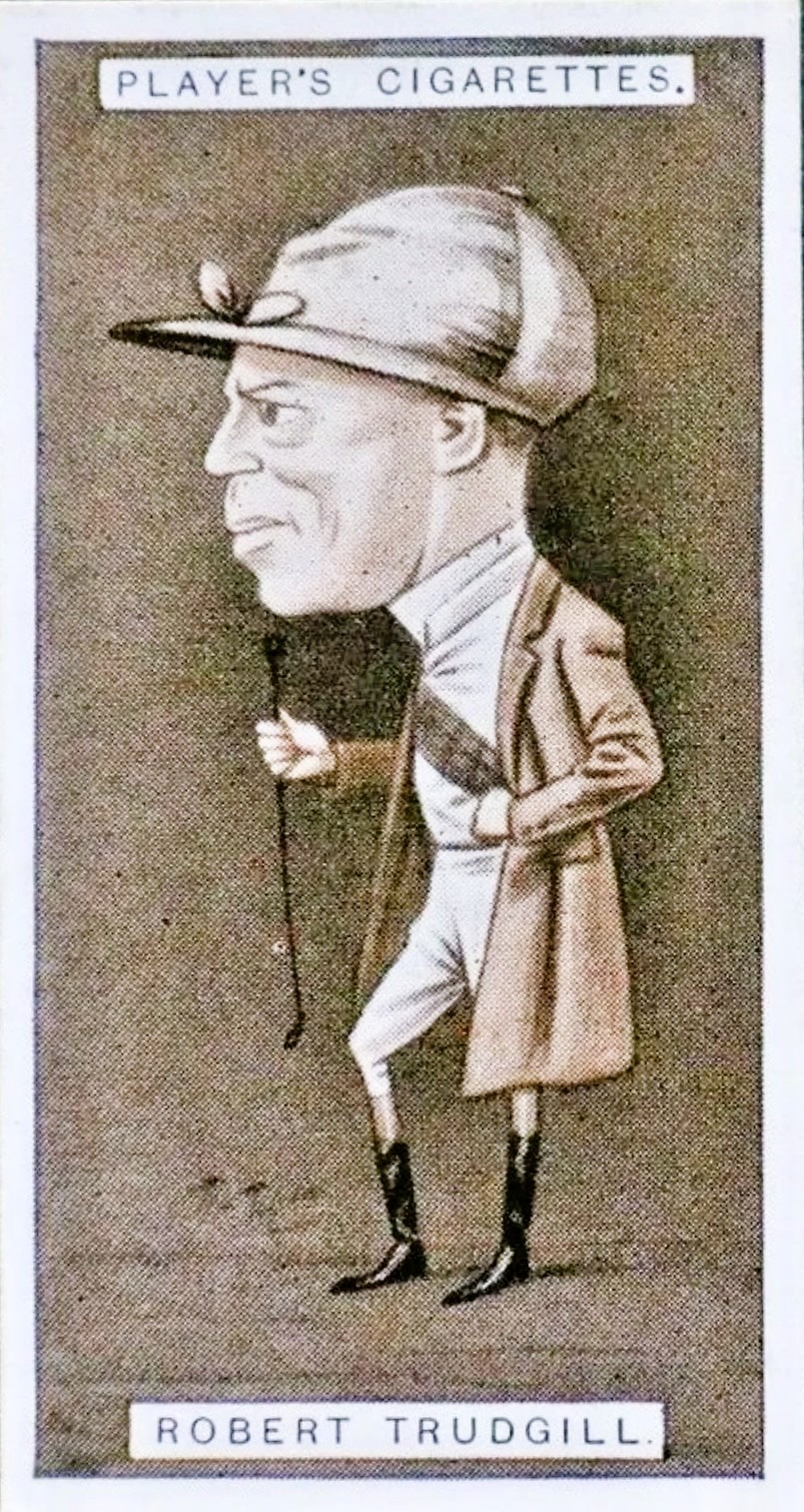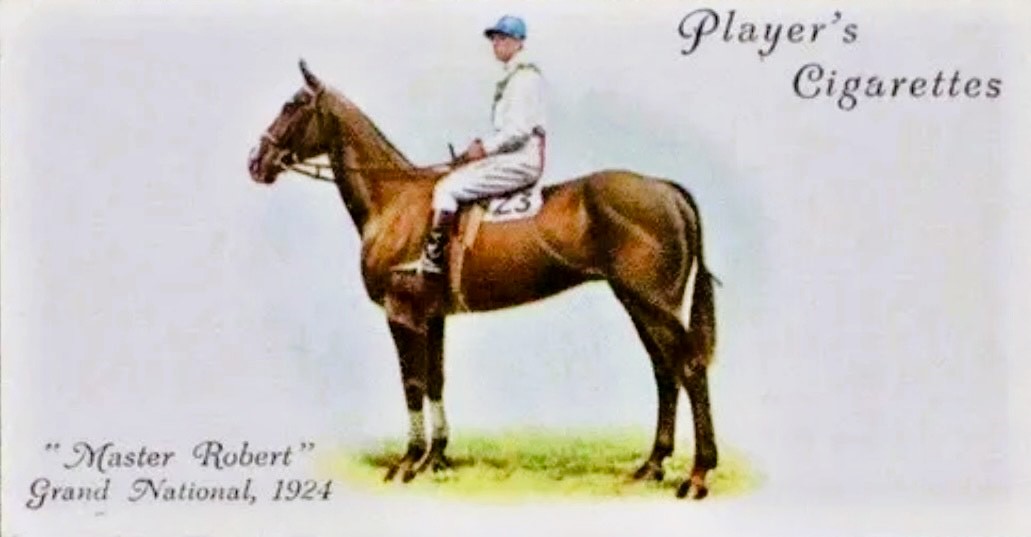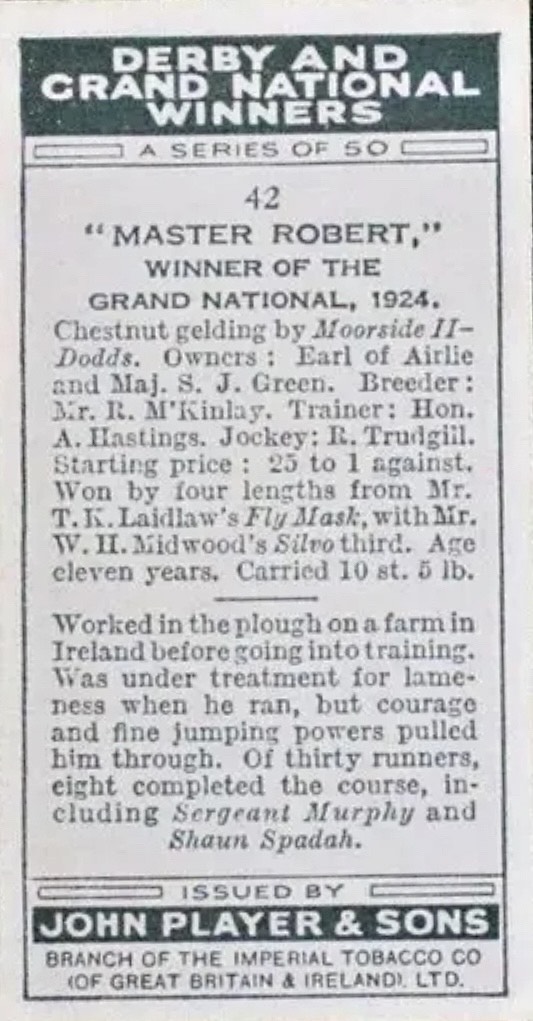
Master Robert with Bob Trudgill, Lord Airlie and Aubrey Hastings
In 1912, amidst a steadily increasing drumbeat of Home Rule debate in Ulster, Drumoghill's Robert Patterson was at his wits end with his thoroughbred mare Dodds, a horse he inherited several years earlier from a Scotsman of the same name who unceremoniously left his wintered, weakly filly in Patterson's perpetual care.
As the horse grew into a mare, she produced for Patterson several foals of no distinction, and little value. So Patterson thought it time to change strategy, and went to his friend who had Clydesdale stallions.

Robert McKinlay, a prominent Scots-Irish Castlefinn farmer and assistant land commissioner with a reputation for solid horse breeding practices, told his friend that cross-breeding wouldn't produce his desired result.
Aware of his friend's ill-feelings toward his mare, he offered to borrow the horse, as McKinlay had his own plans. Patterson agreed. McKinlay wanted to get into the horse racing game, and needed a thoroughbred mare to put with his stallion, Moorside II, which had won a big race once-upon-a-time at the famous Aintree Racecourse, home of the Grand National. In Spring 1913, this breeding exercise produced a colt, on McKinlay's birthday no less, which he named Master Robert, after his oldest son and heir.
McKinlay lovingly raised his 'huge specimen of a horse', and sent him to The Curragh as a two-year old to train as a flat racer, under the notable Maurice Reidy of Brownstown Cottage.

It didn't take long for Reidy to determine that McKinlay's big colt was a step or two slow for the flats, so he shipped back the young horse and suggested to McKinlay he wait a few years and make him a 'chaser. By now, the Great War was in full swing, and McKinlay had three sons serving: Robert, Alexander and Arch.
He had the horse gelded. Time stood still for a few years, and Master Robert ploughed McKinlay's 300-plus acres, growing stronger in the process. Thankfully, McKinlay got all three sons back when the war ended, and decided to send six year old Master Robert back to the Curragh in 1919, this time to train with Algy Anthony, who had won The Grand National for HRH Prince of Wales as a jockey aboard Ambush II. Now, Anthony was training jumpers, and his prized charge was Troytown, who was preparing for the 1920 Grand National.
For whatever reason, Master Robert didn't take to his equine training partner, or new trainer. Despite being in the best company to prepare for a National Hunt career, Master Robert was incorrigible, and with no time to waste, Algy sent the colt back home to Castlefinn, citing him as 'sour and useless'.
With his racing experiment a spectacular failure, McKinlay did what any land-farming horse owner might - have him earn his keep in chains, ploughing McKinlay's fields. Typical of his nature of late, Master Robert refused. McKinlay loved his big animal almost like another child, but what to do with a horse unwilling to race and work in chains? Fortunately for McKinlay, around the same time Troytown won The Grand National, he persuaded his friend J.T. Elliott of Strabane to take the lazy horse off his hands, for a song.
Elliott quickly learned the same lesson and told McKinlay he sold him after just six weeks.
Years later, word got to McKinlay at Sessiaghmore that his old horse was in England - a National Hunt jumper - owned by Scottish Peer Lord Airlie, and trained by Aubrey Hastings. A bit later, in late March 1924, McKinlay and the rest of the sporting world heard the news: 25/1 Donegal-bred Master Robert had won The Grand National over twenty-nine others, a field which included the last three winners of the event since Troytown won, ridden brilliantly by Bob Trudgill, his journeyman jockey of last resort. You can watch footage from Pathe of the race here.

McKinlay must have shaken his head, smiled and thought somewhat bittersweetly: "Somebody, somehow got through to that horse". And so it goes ...
Francis X. Murray, a fourth-generation Irish-American with ancestral roots in Derry, Tyrone and Tipperary, lives in New York City. He has researched Master Robert's life journey, which involves a family connection, and written a non-fiction novel manuscript which will be submitted to literary agents and publishers for consideration. All rights reserved. Visit his website for more details and to stay in touch in advance of book launch
Subscribe or register today to discover more from DonegalLive.ie
Buy the e-paper of the Donegal Democrat, Donegal People's Press, Donegal Post and Inish Times here for instant access to Donegal's premier news titles.
Keep up with the latest news from Donegal with our daily newsletter featuring the most important stories of the day delivered to your inbox every evening at 5pm.